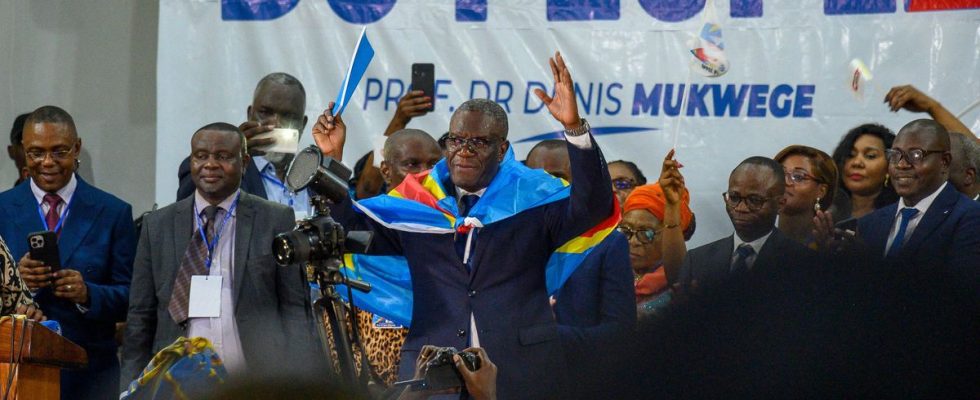He inherited his nickname, “the man who repairs women”, after a documentary recounting his action on behalf of raped women. Nobel Peace Prize winner in 2018, doctor Denis Mukwege will try to probe and seduce the hearts of the Congolese. The 68-year-old announced Monday in Kinshasa his candidacy for the presidential election, which will be held on December 20 in the Democratic Republic of Congo.
Will this figure of civil society be able to shake up the established order and take the place of outgoing President Félix Tshisekedi, in power since 2019 and candidate for his own re-election? What political destiny lies ahead for this “rebellious citizen”? Decryption with Trésor Kibangula, political analyst at the Congolese Institute for Research on Politics, Governance and Violence.
Is Denis Mukwege’s candidacy a surprise?
Not really. He received a lot of support. Many figures from civil society had been pushing for several months for him to run. He has been thinking about getting involved for several years now, he has been working in the east of the country alongside victims of sexual violence for a long time. As he said yesterday [lundi], he thinks it’s time. Before, he remained in ambush for the political class to call on him, particularly during the crisis of 2016. This opportunity never came. Today, he tries to exploit the dynamic that is being created around him.
Is he likely to win on December 20?
It’s difficult to say, the voting method only has one round. There are also several opposition candidates, including several leading figures, who have already declared themselves or will soon do so before October 8 [date limite de dépôt des candidatures]. Martin Fayulu, unsuccessful candidate in the last presidential election who continues to claim his victory, will be there. Moïse Katumbi, who was unable to run in 2018, prevented by the government, is also running.
There will also be two former prime ministers. When you add to that Dr. Mukwege, that’s a lot. For the opposition, it will be complicated to win if there is not a dynamic that would push certain candidates to step aside to bring about a common candidacy. If the big fish line up behind him, then he might have a chance. In the current context, this promises to be difficult, hence his call for unity.
Denis Mukwege is known worldwide, but what is his image and popularity in Congo?
He is respected, he speaks to the Congolese. As at the global level, its reputation is established and it is a reason for pride. But that’s not all. We need to have relays across the country who will be able to convince people to vote for him. This will be his big challenge. He succeeded in setting up a political group which will participate in the legislative elections [elles se tiendront en même temps que l’élection présidentielle]. We will see if the university professors who gather around him will be able to constitute this mobilizing force.
How can you summarize your general political position?
During his candidacy announcement speech, he positioned himself as a man of disruption, who wants to attack the system. In Congo, for several decades, a political system of predation favors the elite. The different teams in power have monopolized public resources. After Kabila, the Congo changed regime but we see that the system was still stronger than everyone’s desire for change. Dr Mukwege wants to position himself against all this. Before his formal commitment, he was always quick to take a stand to denounce armed violence in the east of the country, where he lives, to raise the voice of the victims.
Now that he has declared himself, is Dr. Mukwege set to last in politics? Or could a failed application result in withdrawal?
If he is not elected, perhaps he will try to come back in 2028. In his entourage, some people were already trying to convince him to wait for a possible second five-year term of Félix Tshisekedi before trying his luck. If he comes today, it is also to mark the occasion, not to make up the numbers and leave.
If elected, how does he intend to position himself towards France?
The Democratic Republic of Congo is not a former French colony, there are necessarily tense relations with France, except recently with the situation in eastern Congo and Rwanda. With Denis Mukwege, it should not revolutionize the usual bilateral relations between Congo and France.

